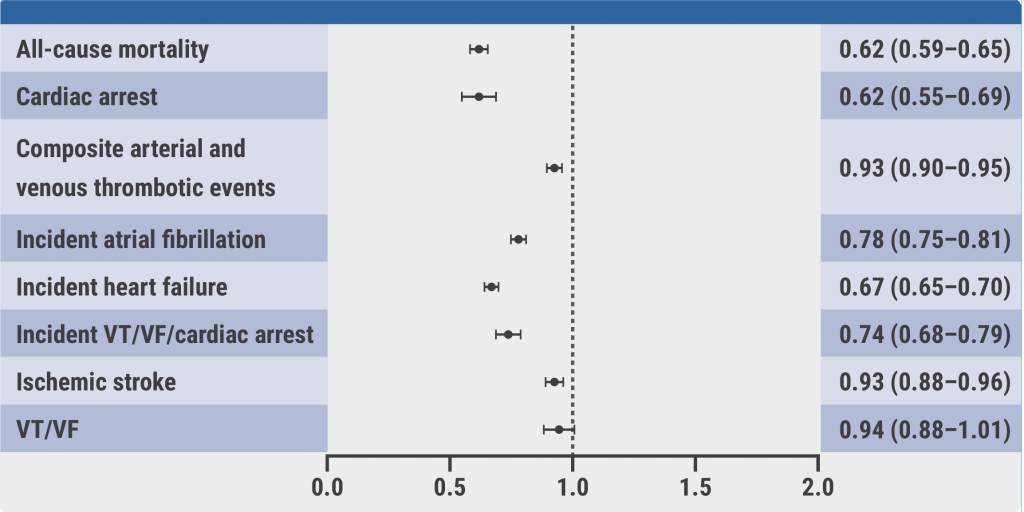https://doi.org/10.55788/48cd963d
The use of SGLT2 inhibitors has been associated with improved outcomes in patients with prevalent HF, regardless of the diabetic status of the patient [1]. Moreover, SGLT2 inhibitors have been shown to exert their effect through various cardiometabolic and cardio-renal pathways [2]. The current study aimed to assess the impact of SGLT2 inhibitors on the risk of HF and cardiovascular events in patients with diabetes [3]. Data from the TriNetX database was used to compare 115,749 patients with diabetes who were treated with SGLT2 inhibitors with 11,749 matched participants who were not treated with SGLT2 inhibitors. The primary outcome was the rate of HF incident. Dr Ameenathul Fawzy (Liverpool Heart and Chest Hospital, UK) presented the results.
After 2 years of follow-up, the rate of HF was significantly lower in patients who were treated with SGLT2 inhibitors (HR 0.67; 95% CI 0.65–0.70). Most secondary outcomes displayed a significant benefit of SGLT2 inhibitors: all-cause mortality (HR 0.62), cardiac arrest (HR 0.62), composite arterial and venous thrombotic events (HR 0.93), AF (HR 0.78), ventricular tachycardia/ventricular fibrillation/cardiac arrest (HR 0.74), and ischaemic stroke (HR 0.93). The number of ventricular tachycardia/ventricular fibrillation events was the only secondary outcome that did not significantly favour patients who were treated with SGLT2 inhibitors over those who were not (HR 0.94; 95% CI 0.88–1.01; see Figure).
Figure: Incident HF and other outcomes in diabetic patients with or without SGLT2 inhibitors [3]

“These outcomes show that the benefits of SGLT2 inhibitors appear to extend beyond HF-associated outcomes,” argued Dr Fawzy. “Although we observed that SGLT2 inhibitors mediate their effects through multiple pathways, further research is required to evaluate the effects of these agents on specific patient populations, such as post-MI patients.”
- Tsampasian V, et al. Cardiol Res Pract. 2021:9927533.
- Cowie MR, et al. Nat Rev Cardiol.2020;17:761–772.
- Fawzy AM, et al. Incident arrhythmias, heart failure and cardiovascular outcomes with SGLT-2 inhibitor use in diabetic patients: Insights from a global federated electronic medical record database. News on atrial fibrillation, EHRA 2022, 3–5 April, Copenhagen, Denmark.
Copyright ©2022 Medicom Medical Publishers
Posted on
Previous Article
« Updates on anti-arrhythmic agents Next Article
Letter from the Editor »
« Updates on anti-arrhythmic agents Next Article
Letter from the Editor »
Table of Contents: EHRA 2022
Featured articles
Letter from the Editor
Diagnostics and Prevention
Cardiac magnetic resonance imaging improves prediction of post-MI sudden cardiac death
AI model accurately predicts sudden cardiac death in overall population
AI model accurately discriminates between arrhythmias
Impact of AF screening on stroke prevention influenced by systolic blood pressure
Developments in Devices
Conduction system pacing potential alternative for biventricular pacing in heart failure
Left bundle branch area pacing is a feasible technique for HF and bradyarrhythmia
Focus on the efficacy of cardiac resynchronisation therapy in HF plus concomitant AF
RESET: No survival benefit of CRT-defibrillator over CRT-pacemaker in heart failure
Insertable cardiac monitors effective for AF detection in cryptogenic stroke
Updates on Ablation
First results of the POWER FAST III trial
Real-world safety results on pulsed-field ablation with pentaspline catheter
VANISH: Ablation reduces shock burden compared with anti-arrhythmic drug in ventricular tachycardia
Low AF recurrence rates after PVI using pulsed-field ablation
Pulsed-field ablation reduces neurocardiac damage versus cryoballoon ablation
Ultrasound-guided femoral venipuncture reduces complications in catheter ablation
News on Atrial Fibrillation
Sex differences revealed in AF determinants and AF progression
Early rhythm-control therapy efficacious in men and women with AF
Progression in remote app-based monitoring of atrial fibrillation
Other Topics
Benefits of SGLT2 inhibitors may extend beyond HF-associated outcomes
Related Articles
© 2024 Medicom Medical Publishers. All rights reserved. Terms and Conditions | Privacy Policy
HEAD OFFICE
Laarderhoogtweg 25
1101 EB Amsterdam
The Netherlands
T: +31 85 4012 560
E: publishers@medicom-publishers.com

